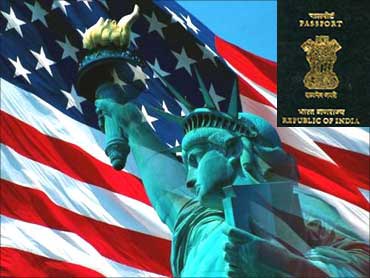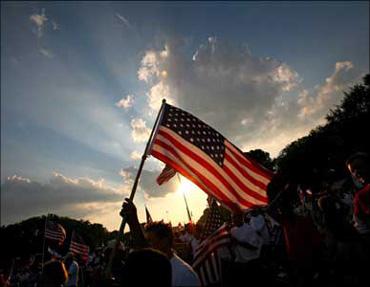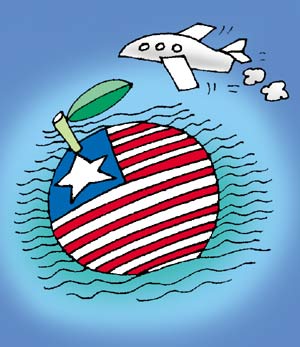 | « Back to article | Print this article |
H-1B visa reaches mandated cap of 65,000
Applications for US H-1B visas, the most sought after by Indian professionals for working in America, have reached the Congressional-mandated cap of 65,000 for the current fiscal with USCIS receiving an unusually high number of petitions in the first four weeks of this month.
In a statement, US Customs and Immigration Services announced that it has received a sufficient number of H-1B petitions to reach the statutory cap for fiscal year 2011.
Given that some 11,000 H-1B visas were still available at the end of 2010, USCIS received an unusually high number of applications in the first four weeks of this month.
The H-1B is a non-immigrant visa in the US which allows American companies to temporarily employ foreign workers in specialty occupations.
In 2009, the cap of 65,000 was reached on December 21.
In 2008, the cap was reached on April 8 and the USCIS had to resort to computerised draw of lots to determine successful applicants.
Till a couple of years ago, the cap in H-1B visas was reached in the first few days of USCIS starting to accept applications.
USCIS is notifying the public that January 26 is the final receipt date for new H-1B specialty occupation petitions requesting an employment start date in fiscal year 2011.
Click NEXT to read further. . .
H-1B visa reaches mandated cap of 65,000
Properly filed cases will be considered received on the date that USCIS physically receives the petition; not the date that the petition was postmarked.
USCIS will reject cap-subject petitions for new H-1B specialty occupation workers seeking an employment start date in FY2011 that arrive after January 26, 2011, the statement said.
On December 22 last year, USCIS had also received more than 20,000 H-1B petitions filed on behalf of persons exempt from the cap under the 'advanced degree' exemption.
It will, however, continue to accept and process petitions that are otherwise exempt from the cap, USCIS said.
In a report early this month, the government accountability office said that nearly half of the H-1B work visa holders in the US are from India.
In its report 'H-1B Visa Program: Reforms are needed to minimise the risks and costs of current program', GAO said between 2000 and 2009, 46.9 per cent of the total approved H-1B visa holders had India as their country if birth.
"Between fiscal year 2000 and fiscal year 2009, the majority of approved H-1B workers (initial and extensions for both employers subject to the cap and cap-exempt employers) were born in Asia," said the report on H-1B visa.
"Over the last decade, the top four countries of birth for approved H-1B workers were India, China, Canada, and the Philippines.
Click NEXT to read further. . .
H-1B visa reaches mandated cap of 65,000
"Across all 10 years, about 64 per cent of approved H-1B workers were born in these four countries, with the largest group from India," it added.
"Although information on the total H-1B workforce is lacking, data on approved petitions show that, since 2000, most people that were approved to be H-1B workers were born in China or India, were hired for technology positions, and increasingly held advanced degrees," it said.
To ensure that the H-1B program continues to meet the needs of businesses in a global economy while maintaining a balance of protections for US workers, the report recommended that the Congress may wish to consider reviewing the merits and shortcomings of key program provisions and making appropriate changes as needed.
Such a review may include, but would not necessarily be limited to (1) the qualifications required for workers eligible under the H-1B program, (2) exemptions from the cap, (3) the appropriateness of H-1B hiring by staffing companies, (4) the level of the cap, and (5) the role the program should play in the US immigration system in relationship to permanent residency.


